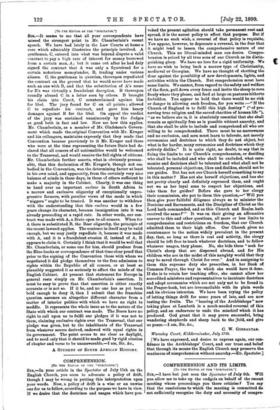[To THE EDITOR OF THE "SPECTATOR."] Sui,—It seems to me
that all your correspondents have missed the strongest point in Mr. Chamberlain's recent speech. We have had lately in the Law Courts at home a case which admirably illustrates the principle involved. A gentleman, C, entered into what was beyond dispute a valid contract to pay a high rate of interest for money borrowed from a certain man, A; but it came out after he had duly signed the contract that A was only a figurehead for a certain notorious moneylender, B, trading under various aliases. C, the gentleman in question, thereupon repudiated the contract on the ground that he would never have made such an one with B, and that the substitution of A's name for B's was virtually a fraudulent deception. B thereupon roundly abused C in a letter seen by others. B brought his claim into Court, C counterclaimed against him for libel. The jury found for C on all points ; allowed C to repudiate his contract, and gave him heavy damages against B for the libel. On appeal the verdict of the jury was sustained unanimously by the Judges as good both in fact and law. Now see how this applies. Mr. Chamberlain, as a member of Mr. Gladstone's Govern- ment which made thea)riginal Convention with Mr. Kruger and his colleagues, maintains expressly that they made that Convention because previously to it Mr. Kruger and those who were at the time representing the future State had de- clared that all comers of all nationalities would be welcomed
to the Transvaal, and would receive the full rights of citizens. Mr. Chamberlain further asserts, what is obviously presum- able, that this declaration of Mr. Kruger's, though not em- bodied in the Convention, was the determining factor at least in his own mind, and apparently, from the certainly very nice balance of minds in those days, in those of others sufficient to make a majority in the Cabinet. Clearly, it was one thing to hand over an important enclave in South Africa to a narrow and exclusive oligarchy of exceptionally unpro- gressive farmers, with peculiar views of the mode in which " niggers " ought to be treated. It was another to withdraw with the understanding that this enclave would in a few years change its character, because immigration into it was already proceeding at a rapid rate. In other words, our con- tract was made with A, a State open to all comers. When for A there is substituted B, the Boer oligarchy, the principle of the recent lawsuit applies. The contract in itself may be valid enough, but we may justly repudiate it, because it was made with A, and it is a fraudulent evasion if, instead of A, B appears to claim it. Certainly I think that it would be well that Mr. Chamberlain, or some one for him, should produce from the Blue-books or correspondence of that time clear proof that prior to the signing of the Convention those with whom we negotiated it did pledge themselves to the free admission to rights within the Republic of all comers, or at least so plausibly suggested it as seriously to affect the minds of the English Cabinet. At present that statement for Europe in general rests simply on Mr. Chamberlain's assertion. It must be easy to prove that that assertion is either exactly accurate or is not so. If it be, and no one has as yet been bold enough to deny it, then I submit that the franchise question assumes an altogether different character from a matter of interior politics with which we have no right to meddle. It represents the whole issue as to the nature of the State with which our contract was made. The Boers have no right to call upon us to fulfil our pledges if it was not to them, claiming exclusive rights over the Transvaal, that our pledge was given, but to the inhabitants of the Transvaal from whatever source derived, endowed with equal rights in its government. The point seems to me clear as daylight, and to need only that it should be made good by rigid citation of chapter and verse to be unanswerable.—I am, Sir, &c., A STUDENT OF SOUTH AFRICAN HISTORY.


































 Previous page
Previous page